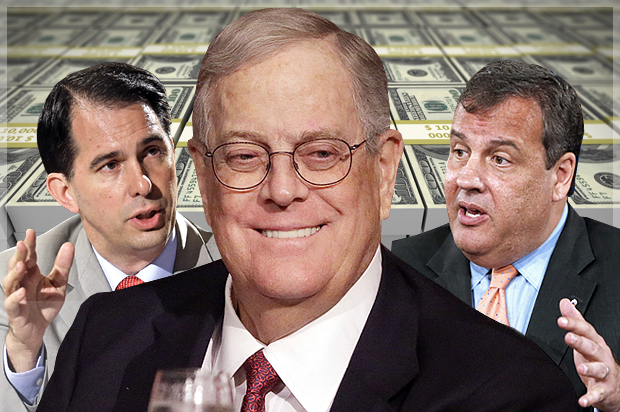Besides our learning that one of the nation’s most valuable properties is outrageously vulnerable to attack, the biggest news on Tuesday probably came from the Koch brothers, who are reportedly planning to organize and spend nearly $1 billion (that’s billion, with a b) on the 2016 election. As the New York Times and Politico both noted, that figure would be significantly more than either the Republican or Democratic parties spent in 2012. At least in terms of financial power, it would potentially turn the Koch brothers into the most significant third party in U.S. politics since the days of Bull-Moose. Even if we assume that, like early reports of an NFL contract, the number is inflated for purposes of hype, it is still a lot of money.
Of course, this is far from the first time the Kochs have promised to man liberty’s ramparts, checkbooks in hand. In advance of the 2012 election, for example, they made a lot of noise about wielding their largess. And subsequent reports, which found them to have raised more than $400 million to defeat President Obama, proved they were not bluffing. Yet despite all that, 2012 ended up being quite a good year for Democrats — so good, in fact, that it led some observers to conclude that the effects of outside spending in American elections are overrated.
I fully expect to hear some too-clever-by-half contrarians make the same argument in the coming weeks and years. They’ll tell us that the Kochs aren’t remotely as important or influential as liberals — and the Kochs themselves — would like to think. And as tends to be the case with contrarianism, which I’m distinguishing here from straight-up trolling, the contrarians will have some kernels of truth embedded in their spin. Nevertheless, a small but profound insight from deep within the Politico report shows why we shouldn’t believe the folks asking us to pay no attention to the men behind the super PAC curtain.
According to Politico, the Kochs, and their network of hyper-wealthy and comparably conservative donors, show an “eagerness … to resume their big giving” that is undeterred by 2012’s failures. They do this, the piece continues, because they “are taking a long view” of their mission, one that Politico describes as “unusual in American big money politics.” That’s probably a veiled reference to George Soros, who took his ball and went home after John Kerry lost in 2004. But it’s definitely an accurate reading of how the Kochs are running their operation — which, if we shift our focus away from the White House, is hard to describe as anything less than a success.
Here’s what the long game looks like, at least the way the Kochs are playing it. The long game is a House of Representatives that is, thanks in part to Citizens United and the 2010 census, almost guaranteed to stay Republican for the foreseeable future. The long game is a GOP establishment that knows it can only diverge from the Tea Party in style (and not substance) if it wants to survive a primary challenge from a Koch-funded opponent. The long game is a new era of almost unprecedented dominance on the part of the GOP when it comes to politics on the state level. And the long game is a feeder system that sends those far-right state-level conservatives to Congress — while threatening to replace them with someone else if their time in D.C. weakens their devotion to the cause.
In other words, if you broaden your timeline since 2010 from years to decades, the Koch brothers’ track record starts looking a whole lot better. At the same time, the Democrats’ chances to build a new, economically populist party for the 21st century start to look a whole lot worse. Have you heard that because Democrats are so few in number on the state level and in the halls of Congress, the party lacks a “bench”? Sure, that’s partially just the usual partisan crowing from right-wingers. But like the Kochs themselves, these conservatives are looking at state politics for a reason. Another example: Americans often pick governors as their presidents. Almost every high-profile governor in the U.S. right now is a Republican; you can partially thank the Kochs for that, too.
So while I’m sure the Kochs desperately want Republicans to win the White House in 2016 — especially given the stakes for the Supreme Court, which are likely to be abnormally high — I have no doubt that much of their promised nearly $1 billion will be trickling down to races that are much further from public view. The Kochs and their buddies are fighting the battles of the here and now, of course. But they’re trying to design a right-wing machine to dominate American politics in the near- and medium-term future, as well. On the whole, it’s gone rather well for them thus far. And as Tuesday’s news showed, they have no intention of stopping.

